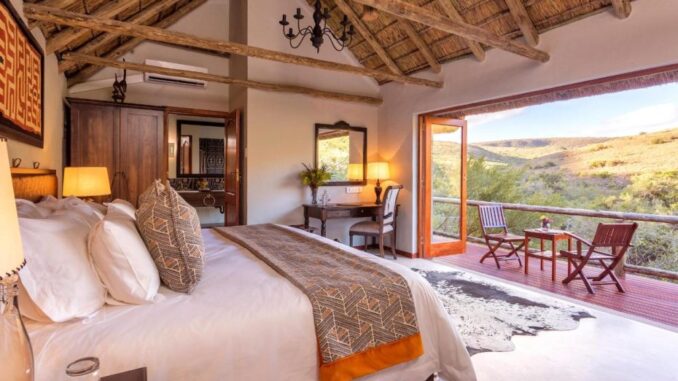
This summer season has been marked by a feeling of excitement and anticipation at Lalibela Game Reserve in the Eastern Cape, where the drought has broken, newborn life is being welcomed and a passionate new CEO has taken the helm.
With its six magnificent lodges, unique 10 500-hectare multi-biome landscape, Big 5, vast herds of plains game, multitudes of smaller creatures and vibrant birdlife, Lalibela always treats its guests to an adventure like no other. But, while blessed with sufficient natural grasslands to allow wildlife to continue to thrive, this region of the Eastern Cape has nonetheless recently weathered a tumultuous seven-year drought which left dams, rivers and waterfalls diminished, restricting flow and forcing many reserves in the area to supplement their water supply.
Then, in September, steady rain finally arrived, filling dams and causing rivers to flow and waterfalls to gush for the first time in many years. The water table rose to pre-drought levels, and vegetation grew to be a lush haven for the animals.
Excitingly, this welcome boom of abundant greenery coincided with the arrival of ‘baby season’ on the reserve. Traditionally, mid to late November and early December are calving and lambing season for a range of antelope, including red hartebeest, impala, blesbok, nyala, eland, black wildebeest and common duiker, and giraffe young are also typically seen during this period. So Lalibela is teeming with young animals, and on every safari drive and walk until early January 2024, guests will get the chance to see this precious new life for themselves.
At the same time, due to the abundance of smaller animals, this is also a period when predator activity skyrockets. One predator on the reserve that is experiencing its own kind of new beginning is the world’s fastest land animal: a couple of months ago, one of Lalibela’s cheetahs gave birth to a litter of four. The adorable eight-week-old cubs, while still reliant on their mother’s milk and hunting skills, are moving with the mother and learning vital survival skills to equip them for life on the reserve.
Cheetahs are undoubtedly one of the continent’s most iconic and beloved big cats, yet they are also one of the most endangered, with fewer than 7 000 in the wild today. Lalibela’s core mission has always revolved around the conservation of indigenous flora and fauna, so the new cubs are not just a cause for celebration, but also a testament to Lalibela’s unwavering commitment to the conservation of African wildlife.
While Lalibela is run on business principles, all profits generated are ploughed into the conservation of the land, animals and wider community – and every member of the Lalibela team is part of this mission. This is why the company is thrilled to announce the appointment of Johann Lombard as its new CEO. He brings more than three decades of experience in eco-tourism development, conservation and guiding, specialising in dangerous game, natural sciences and the subtle genius of regenerative sustainability. Over the past ten years, he has worked with internationally renowned safari brands, and most recently was the managing director of an upcoming eco-tourism operator in Ethiopia.
One of the most notable features of Lombard’s career is his steadfast commitment to not only the conservation of natural environments, but also educating industries and people on the importance of ethical natural encounters, making him an ideal fit for Lalibela.
The malaria-free Eastern Cape with its temperate climate is a popular province for African safari seekers year-round, but the summer months, with their abundance of babies and the return of migratory birds, are a special time to visit. And Lalibela Game Reserve is especially eager to share its new beginnings with its guests.
